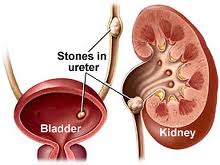[su_divider top=”no” style=”double” divider_color=”#952524″ link_color=”#952524″ size=”2″ margin=”10″]
What are kidney stones? How to manage it? What are the precautions to be taken? What are the signs and symptoms? What is the cause of this disease? How to treat it? How can homeopathy help you? All of this answered, in this post and of course our doctors always there to help you. Just fill in your details in the form down below and we will answer all your questions for FREE!
[su_divider top=”no” style=”double” divider_color=”#952524″ link_color=”#952524″ size=”2″ margin=”10″]
[sc name=”query”]

What renal/ kidney stones is?
The kidney stones are also known as renal calculi or Nephrolithiasis, it can affect any part of your urinary tract which results in blood in the urine, abdominal pain and cramps sometimes vomiting and urine infection.
These stones are solid masses made of crystals.
Who are at risk of kidney stones?
Urinary tract stones are more common in men than in women.
What are the types of kidney stones?
• Calcium stones
The calcium stones are the most common type and are formed by a build-up of calcium, combining with oxalate, phosphate or carbonate. They are more likely to occur in men.
• Uric acid stones
Uric acid stones are formed by a build-up of uric acid.
Uric acid stones account for 5 to 10 percent of all stones and are more likely to occur in men.
• Struvite stones (infection stones)
The struvite stones are formed by a build-up of calcium, magnesium and ammonium phosphate. Struvite stones account for 10 to 15 percent of all stones, are mainly found in women.
• Cystine stones are formed by a build-up of cystine, combining with lysine, arginine and ornithine.
• Cystine stones account for 1 percent of all stones. Cystinuria occurs as a result of the kidney tubules not reabsorbing certain amino-acids adequately.
• Cystine stones occurs in both men and women equally.
What are the causes of kidney stones?
• Family history of kidney stones.
• Recurrent UTI.
• Gout results in chronically increased amount of uric acid in the blood and urine and can lead to the formation of uric acid stones.
• Hypercalciuria -high calcium in the urine
• Other conditions associated with an increased risk of kidney stones include hyperparathyroidism, kidney diseases such as renal tubular acidosis, cystinuria and hyperoxaluria.
• Chronic diseases such as diabetes and hypertension are also associated with an increased risk of developing kidney stones.
• IBS patients are likely to develop kidney stones.
• Some medications also raise the risk of kidney stones. These medications include some diuretics, calcium-containing antacids.
• Dietary factors – In particular, inadequate fluid intake predisposes to dehydration, which is a major risk factor for stone formation. Apart from this high intake of animal protein, a high-salt diet, excessive sugar consumption, excessive vitamin D supplementation.
• Excessive consumption of alcohol
What are the sign and symptoms of kidney stones?
• Severe pain, which usually starts suddenly and may last from minutes to hours, followed by long periods of relief. Kidney stone pain usually starts in the kidney or lower abdomen and later may move to the groin.
• Nausea, vomiting, sweating
• burning and the urge to pass urine
• frequent urination
• cloudy or foul-smelling urine
• fever (if infection is present)
• Chills
• blood in the urine (hematuria)
• bloating
• pus in the urine
What is the differential diagnosis of kidney stones?
• Abdominal abscess
• Biliary colic
• Cholecystitis
• Diverticulitis
• Duodenal ulcers
• Gastritis
How to investigate kidney stones?
• Diagnostic tests include a blood test, a urine test and a 24-hour urine collection test.
• The 24-hour urine test is done to monitor urine volume.
• kidney-ureter-bladder (KUB) x-ray
• kidney ultrasound
• Intravenous pyelogram (IVP) and CT scan.
How to treat kidney stone?
• Fortunately, most stones can be treated without surgery.
• In addition to extra water consumption, the doctor may prescribe antibiotics to fight infection, pain relievers to help with the pain, an antispasmodic to relax the ureter muscles or diuretics to prevent urine from staying in the kidney.
• Currently there are four (4) methods of stone removal:
• Extracorporeal Shockwave Lithotripsy (ESWL)
• Percutaneous Nephrolithotomy (PNL)
• Ureteroscopy Stone Removal
• Surgical Treatment
What are the complications of kidney stones?
• Abscess formation
• Serious infection of the kidney that diminishes renal function
• Urinary fistula formation
• Ureteral scarring and stenosis
• Ureteral perforation
• Urosepsis
How to manage the case of kidney stones?
• Drink plenty of water.
• Other fluids such as – coconut water, barley water and fruit juices
• Avoiding high protein diet
• Avoiding vitamin and mineral supplements
• Bed rest
• Avoiding preparations that may contain Vitamin D
• Avoiding Spinach, lady finger, brinjal, water melon.
Can homeopathic medicines help to treat renal stones?
Yes, homeopathic medicines in the case of renal stones. Some of the homeopathic medicines which can help in renal stone. These are:
-Belladonna
-Berberis vulgaris
-Cantharis vesicatoria
-China officinalis
-Lycopodium clavatum
-Sarsaparilla officinalis
For more information, you can visit MayoClinic and WebMD.
Kidney Stones
[su_divider divider_color=”#952524″ link_color=”#952524″ size=”2″ margin=”10″]
[sc name=”know-your-doctor”]
[sc name=”more-links-diseases”]

